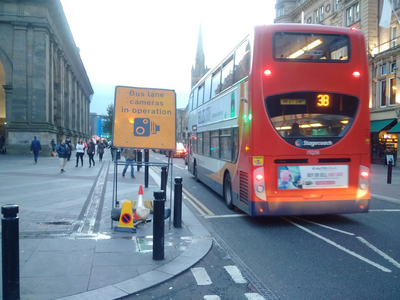Lib Dem Opposition presses Newcastle City Council on progress on Clean Air Action Plan and call for greener buses and taxis target

The Liberal Democrat Opposition on Newcastle City Council have challenged the council's Labour administration to produce an updated air quality management plan for the city and to set out a Clean Air Action Plan, following growing concern about air pollution levels in the city centre and on key arterial routes including the Coast Road, Great North Road, and West Road corridors.
The Government is required by the High Court to produce a draft national clean air plan by April 24th, to be finalised by 31st July, and this is expected to require major cities to adopt local clean air plans to tackle NO2 pollution. London's Mayor has already announced plans for ultra low emission zones in the capital, involving a £10 daily charge on the most polluting diesel goods vehicles and a requirement for new taxis to comply with low emissions standards.
The City Council currently has two Air Quality Management Areas covering the city centre and Gosforth, but other areas are also now causing concern. The council's existing policies date from 2006 when the council was under Liberal Democrat control. In 2013, the council commissioned a report by Capita Symons & Newcastle University which recommended against introduction of a city centre low emission zone on the grounds that costs would exceed revenue, and that "natural replacement" of existing vehicles would contribute to a reduction in emission levels. The report also noted that introduction of a Low Emission Zone for the city centre would be contrary to the objectives of the Live After Five initiative which includes free parking in the city centre after 5pm.
The council's existing policy is to discourage through traffic in the city centre, but it is recognised that routes around the city centre are increasingly congested and are causing air quality issues. Tackling issues relating to routes such as the Central Motorway and Tyne Bridge approach will be much more difficult.
The Lib Dems are calling for the city council to emulate London's lead by introducing new regulations for the city centre to manage freight vehicle movements, and to require bus and taxi operators to adopt low emission vehicles over a 5 year transition period.
Opposition transport spokesman Cllr Greg Stone said
"Studies suggest that pollution levels outside of the city centre consistently exceeded national limits at the end of 2016, including at hotspots such as the Cradlewell, and we believe that levels in the city centre and at key congestion locations such as the Central Motorway / Tyne Bridge approaches are also likely to breach limits. There is concern that existing policies are not sufficiently addressing the problem, and we know that unsafe air quality has a serious impact on public health.
"The Opposition believes that the current Labour administration at the Civic Centre does not have a good record on sustainability and the environment, but we feel that the national policy context will require the council to take further action on air quality in the near future. We are calling on the city council to do more to improve air quality monitoring in key locations, to extend existing air quality management area coverage, and to publish an action plan to move towards low emission public transport in the city centre by 2022.
"We want the city council to prioritise steps to control HGV movement in the city centre, and to draw up a timetable for requiring bus operators and taxis to transition to low-emission vehicles in the city centre perhaps by 2022. We accept that this will involve a cost to operators, but we feel it is feasible for the council's licensing regulations to ensure that any new vehicles introduced in future should comply with low emissions standards. We would also like to see bus operators doing more to retrofit existing vehicles to improve emissions performance given that they currently generate considerable profits from their dominance of the market.
We hope that there will be a general transition towards low emission vehicles over the coming decade and a move away from use of diesel engines in particular. If air quality problems continue to increase during this time, it will become harder to avoid further restrictions. For now, the priority should be to tackle the vehicles which contribute the most emissions. The Lib Dem Opposition would also like to see the council doing more to accelerate delivery of its strategic cycle route programme which has markedly slowed recently.
